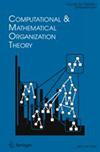为什么我们渴望和害怕关心:朝着发展一个整体的政治方法
IF 1.5
4区 管理学
Q3 COMPUTER SCIENCE, INTERDISCIPLINARY APPLICATIONS
Computational and Mathematical Organization Theory
Pub Date : 2023-01-01
DOI:10.1177/26317877231159683
引用次数: 3
摘要
关怀是人类的一种需要和能力,没有它,我们就无法生存和繁荣。然而,尽管护理受到社会重视,但往往报酬过低,被认为是经济中的过度负担。关于脆弱性的哲学和政治观点对于理解组织和社会中护理的持续破坏至关重要。本文借鉴了女性主义精神分析的具身脆弱性概念,将其定义为我们对他人的内在依赖,来解释当代社会和组织中围绕护理的矛盾心理。我在本文中提出的论点是,这种依赖被错误地与我们必须避免或忽略的弱点联系在一起。新自由主义意识形态——一种渗透到公共生活中的主导影响——将这种相互依赖视为一种道德上的失败,并将其与理性个人的幻想并列,理性个人是无实体的,没有任何社会义务。在本文中,我对这种观点提出了挑战,并主张将护理作为理解组织和社会构成的另一种基础进行更深层次的社会和政治概念化。我利用精神分析的见解作为这一概念的基础,并详细阐述了它如何使我们重新定义关怀,不仅是驻留在支撑组织和社会的关系结构中,而且是在存在的意义上赋予它们生命。正如我在论文中总结的那样,这种扩大的、全面的护理观可能有助于我们解决社会面临的深刻挑战。本文章由计算机程序翻译,如有差异,请以英文原文为准。
Why Do We Desire and Fear Care: Toward developing a holistic political approach
Care is a human need and capacity without which we cannot survive and flourish. However, care is often underpaid and considered an excessive burden in the economy despite being socially valued. Philosophical and political perspectives on vulnerability are essential for understanding the continuous undermining of care in organizations and society. This article draws on the feminist psychoanalytic idea of embodied vulnerability, defined as our intrinsic dependence on others, to explain the ambivalence surrounding care in contemporary societies and organizations. The argument I develop in this paper is that this dependency is erroneously associated with a weakness we must avoid or ignore. Neoliberal ideology – a dominant influence permeating public life – casts such interdependency as a moral failure and juxtaposes it with the fantasy of the rational individual, who is disembodied and free of any social obligations. In the paper, I challenge this view and argue for a deeper social and political conceptualization of care as an alternative basis for understanding the constitution of organizations and society. I draw on psychoanalytic insights as a footing for this conceptualization and elaborate on how it allows us to reframe care not only as residing in the fabric of relations underpinning organizations and society but as in an existential sense giving life to them. As I conclude in the paper, such an expanded and holistic view of care might help us address our societies’ profound challenges.
求助全文
通过发布文献求助,成功后即可免费获取论文全文。
去求助
来源期刊

Computational and Mathematical Organization Theory
COMPUTER SCIENCE, INTERDISCIPLINARY APPLICATIONS-MATHEMATICS, INTERDISCIPLINARY APPLICATIONS
CiteScore
3.80
自引率
16.70%
发文量
14
审稿时长
>12 weeks
期刊介绍:
Computational and Mathematical Organization Theory provides an international forum for interdisciplinary research that combines computation, organizations and society. The goal is to advance the state of science in formal reasoning, analysis, and system building drawing on and encouraging advances in areas at the confluence of social networks, artificial intelligence, complexity, machine learning, sociology, business, political science, economics, and operations research. The papers in this journal will lead to the development of newtheories that explain and predict the behaviour of complex adaptive systems, new computational models and technologies that are responsible to society, business, policy, and law, new methods for integrating data, computational models, analysis and visualization techniques.
Various types of papers and underlying research are welcome. Papers presenting, validating, or applying models and/or computational techniques, new algorithms, dynamic metrics for networks and complex systems and papers comparing, contrasting and docking computational models are strongly encouraged. Both applied and theoretical work is strongly encouraged. The editors encourage theoretical research on fundamental principles of social behaviour such as coordination, cooperation, evolution, and destabilization. The editors encourage applied research representing actual organizational or policy problems that can be addressed using computational tools. Work related to fundamental concepts, corporate, military or intelligence issues are welcome.
 求助内容:
求助内容: 应助结果提醒方式:
应助结果提醒方式:


